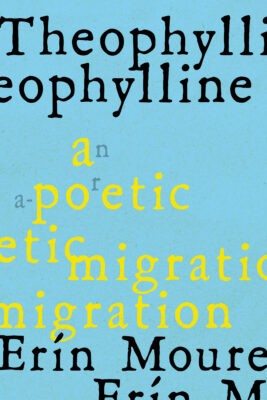Erín Moure’s latest collection, a triumphant work of essai-poetry, combines academic research and cultural criticism, intertwined with original and translated poems. Readers of the experimental and the intertextual will enjoy this next chapter of Moure’s oeuvre, but those seeking a collection of standalone poems may prefer a different selection in this roundup. Theophylline: A Poetic Migration, or rather, Theophylline: an a-poretic migration via the modernisms of Rukeyser, Bishop, Grimké (de Castro, Vallejo), is a deep dive into the archives in search of the obscured. We visit and revisit the poetry of Muriel Rukeyser, Elizabeth Bishop, and Angelina Weld Grimké, finding a trajectory of resilience in non-normative temporalities: “a layered community, an ecology of thresholds.” Moure, with the difficult help of the mysterious Elisa Sampedrín, excavates and translates these modernist poets even though their poems are in English. Rosalía de Castro’s and César Vallejo’s poetry also appears, translated from the original Galician and Spanish respectively.

Theophylline
A Poetic Migration
Erín Moure and Elisa Sampedrín
House of Anansi Press
$22.99
paper
176pp
9781487011604
There is no grail
But poetry makes
of us a grail every
moment
Et ceci, dans
plusieurs langues
For what are we but
“not innocent”
In-innocent and
not bystanders
The archives of the Woodberry Poetry Room at Harvard University, combined with the COVID-19 pandemic, ignited Moure’s multi-layered project to translate and recover a history of queerness and disability from these modernist poets. Moure unpacks the lesbian experience, twentieth-century asthma treatments, and the art of translation all at once in this study of ways of breathing:
To live with poorly medicated asthma in any class conditions is hard, for breathing precedes every other human condition. You can’t be a lesbian before you can breathe, a woman before you can breathe. I call it “allergiqueer,” foreign to and preceding all category, an unstable structure—
Moure’s theorized queer poetics of disability is convincing and compelling, and the studied elements of translation and fragmentation elevate the book to a unique project that I am already excited to return to.mRb






0 Comments